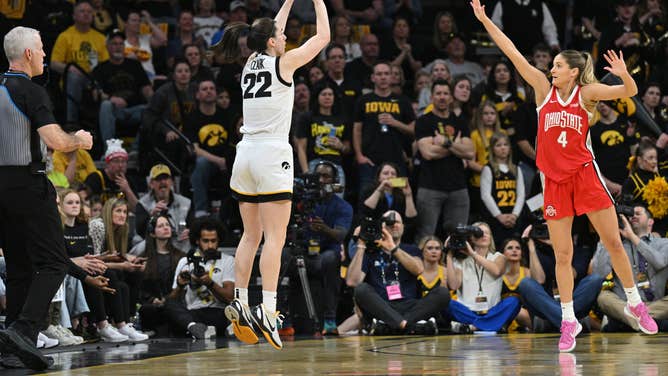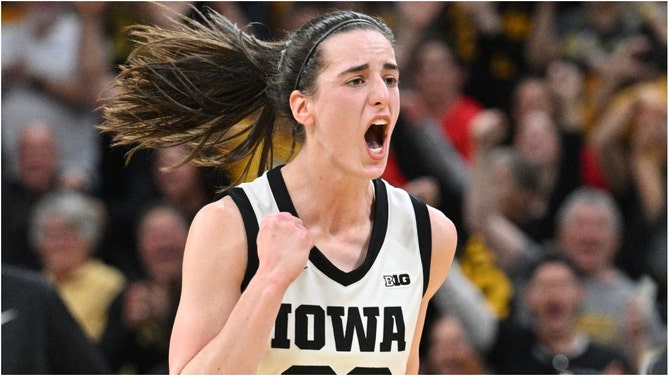USA Today Publishes Racist Column Saying Women’s Basketball Needs Black Stars, Not Caitlin Clark | Burack
Caitlin Clark is the all-time leading scorer in NCAA Division I basketball. She's the biggest star in women's college basketball. She's one of the biggest stars in all of sports today.
Clark is also a white woman commanding a primarily black league. That fact troubles some members of the basketball community.
Earlier this month, former WNBA player Sheryl Swoopes tried to undermine Clark’s legacy with a series of false statements. Swoopes said Clark has played for five years, is 25 years old, and shoots 40 times per game.
When OutKick and a few others questioned whether racial animus contributed to Swoopes’ ignorance, she cited a derivation of Critical Race Theory – saying "Black people can’t be racist."
CRT insists white people can be and are racist. Meaning, it's appropriate to label an article from USA Today on Thursday, in which a white woman penned, just that: racist.
"Women's basketball needs faces of the future to be Black," argued Lindsay Schnell. "Enter JuJu Watkins and Hannah Hidalgo."
The article claims Clark’s whiteness elevated her to superstar status and that the NCAA "must" ensure a black woman takes her place when she graduates later this year.
USA Today is not asking. USA Today is demanding.
Schnell states that black women built the sport, thus it's theirs to star in.
Here are some blurbs from the piece:
"Too often, the Black players who built women’s hoops — and who now dominate the professional level, where the WNBA is 70 percent Black — haven’t been acknowledged. Occasionally, their existence has been wiped from the record books completely, like with former Kansas standout Lynette Woodard's Division-I scoring record not being recognized by the NCAA."
"‘I don’t think it’s anyone’s fault or been anyone’s intention,’ Southern Cal coach Lindsay Gottlieb told USA TODAY Sports. But there haven’t been enough commercial endorsements of Black female superstars in our society, period.’’"
If only one commercial would include Simone Biles, Serena Williams, or Venus Williams.
"As women's basketball grows in popularity, white players get the most attention."
Well, that is just not true. Angel Reese is the second most promoted star in women’s college basketball.
In fact, the media tried to debate whether Reese was better than Clark last season during the tournament, on the back of their on-court rivalry.
If only it weren’t for the facts.

Caitlin Clark will be the top pick in the WNBA draft. (Credit: Jeffrey Becker-USA TODAY Sports)
At this point, you probably wonder what proof USA Today provided to support the premise that Caitlin Clark’s skin color contributes to the attention she receives.
Unfortunately, nowhere in the article does the author cite any proof.
Of course, she didn’t. There is no proof. Caitlin Clark is not a star because she’s white. She’s a star because she is breaking records – including the record set by Pete Maravich.
She’s a phenomenon. She’s generational.
The article later bemoans that "Clark and Iowa regularly play on Fox."
Correct. Fox Sports programs around Clark. ESPN also programs around LeBron James. NBC programs around the Cowboys. It’s called the television business.
Clark is setting television records for women’s college basketball.
On Sunday, her record-setting game for Iowa against Ohio State drew more than 4 million television viewers at its peak, marking the most watched women's regular-season basketball game since 1999.
How dare Fox show that little white girl again!

Caitlin Clark is already causing ticket sales to spike for the Indiana Fever ahead of her being picked first overall. (Credit: USA Today Sports Network)
Clark’s popularity is also organic. The media and NCAA didn’t manufacture her stardom. Her game did.
Clark is to women’s hoops today what Tiger Woods was to golf, what Conor McGregor was to UFC, and what Wayne Gretzky was to the NHL: transcendent.
And that’s what underscores the naivety in Swoopes and Schnell's animus toward Clark.
The superstar status of Woods, McGregor, and Gretzky uplifted their respective, rather niche sports. Clark is doing the same to women's hoops.
Swoopes and Schnell appear unaware of who benefits from Clark’s popularity. The players around her do. The women’s game does. Black women, whom the USA Today notes are the majority demographic in college and professional basketball, do.
A monocultural athlete elevates the game in which they play and all of those who surround.
Clark acquainted women’s basketball to casual sports fans who never much cared about the game, including prominent media personalities like Bill Simmons.
"I care more about the women’s college basketball and the tournament than I do about the men’s at this point in my life," said Simmons on his podcast last week.
"I am the same person who once upon a time, I did not want to watch women’s college basketball. I did not like the product."
He called Clark "the most fun college player." His interest in her prompted him to take an interest in other players on the court:
"There’s continuity. The style of play is good. It’s got a lot of the fundamental stuff that it used to have combined with the slash and kick and the threes."
Simmons is not alone. Women’s college basketball is now routinely topping the NBA in head-to-head ratings, thanks in large part to Clark.
Caitlin Clark will leave women’s college basketball, traditionally a low priority nationally, far more popular than when she entered it.
And there's the WNBA. Undoubtedly, the WNBA – a 70 percent black league – will be more popular next season upon Clark’s arrival.
But, I know, she’s a white woman. It’s hard for Sheryl Swoopes and USA Today to look past her skin color and realize Clark is revolutionizing the sport they purport to support.